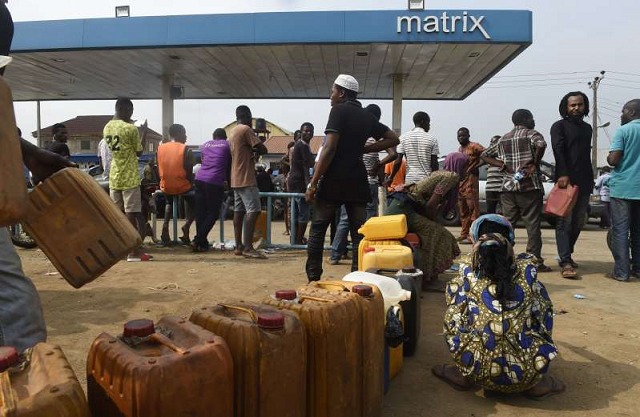Petrol scarcity struck various parts of Nigeria on Tuesday, forcing motorists to spend hours battling for the product at filling stations.
In many parts of the country, black marketers had a field day, selling a litre of fuel for N300-N400. Many motorists were compelled to use them because the unappealing alternative was to wait for hours in filling stations.
In Lagos, amid long lines and long waits, some filling stations sold a litre of Premium Motor Spirit for N200, as opposed to the approved price of N180-N185/litre.
Only one of six petrol stations around the Isolo, Okota, and Ilasa axis in Lagos sold petrol to motorists and other consumers. Others stated that they lacked gasoline.
Two NNPC filling stations in Ojodu before Sule Abore Street were closed. The attendants at the gas stations stated that they were out of gas. They, on the other hand, stated that they expected to receive the supply by the end of yesterday (Tuesday).
As of the time of filing this report, a long queue at Bova’s filling station was causing traffic gridlock along Ogba road.
Similarly, a long line was seen at the Rainoil filling station at Berger Roundabout, with some drivers alleging that fuel attendants charged them an extra N300. The attendants refused to speak with our reporter.
There was also a long line at the Eterna Oil filling station near Afeez Bus Stop in Ojodu Berger. According to one of the fuel attendants, the trucks that were supposed to supply them with fuel did not arrive. A long line was also seen at the Amuf Oil filling station at the Grammar School Bus Stop in Ojodu Berger.
An attendant at Oando filling station, Aguda, after Omole Bus Stop, stated that the recent flood caused fuel prices at depots to skyrocket, making it difficult for many stations to sell at regulated prices.
It was also discovered that while some filling stations sold at N180/litre, others charged as much as N185 as motorists flooded gas station forecourts in search of petrol.
On the Iyana-Iba – Egbeda axis, only two filling stations (Oando and Total) were sold as at the time of this report while the gates of other stations, including the ones belonging to the Nigerian National Petroleum Company Limited (NNPCL), were under lock and key.
Other stations such as TotalEnergies, Ardova, 11 Plc and Fatgbems on the Berger expressway had long queues as of Tuesday morning. Stations such as TotalEnergies and NNPCL sold at N180 per litre.
In Katsina State, operators of illegal fuel depots known as “Bubulutu” were the only ones that sold fuel to motorists and other users of the product.
The few filling stations that still sold the product, especially in the state capital, only sold for a few hours before announcing to motorists that the product was no longer available.
Although the majority of the black market operators sold at N2,000 per four-litre keg, they still recorded heavy patronage due to the non-availability of the product in many filling stations in the state.
Fuel scarcity was first observed at the beginning of October in the state and was attributed to the flooding witnessed along some of the routes which vehicles supplying fuel passed through.
The situation was still on as of Tuesday.It was also observed that the few filling stations sold fuel to motorists N240 and N270 per litre. Some motorists said the development had forced them to buy the products from neighbouring states where they alleged they found it easier to buy without much stress.
A lecturer at a University in Katsina said, “What I do these days before coming to Katsina is to fill up my car either in Kano or in Gusau and also buy an extra 25 litres to take care of my movements while here. I believe the fuel scarcity is more or less artificial, instead of all these flooding reasons being given as excuses.”
As a result of the lack of gasoline, transportation expenses have soared. The N500 transport cost from Iyana-Isolo to the Berger axis in Lagos was hiked to N800 on Tuesday.
Drivers of commercial vehicles traveling from Iyana Oworo to Berger increased their charges from N300 to N400, while those traveling from Ketu to Arepo increased their fares from N400 to N500.
Some passengers traveling from Berger to Obalende and CMS were charged N700 instead of N500. Others who took Berger through the Oshodi/Gbagada axis were charged N500 instead of N500.
One of the drivers blamed the gasoline shortage, claiming that some of them were compelled to use black market vendors to avoid waiting in long lines.













